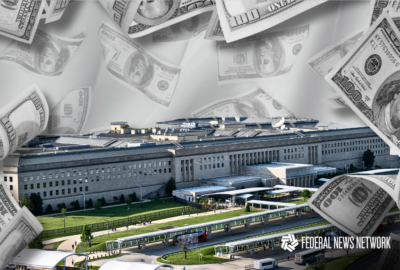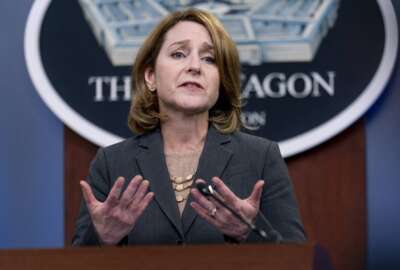Top appropriators push to increase Pentagon’s budget
Appropriators say the budget caps are “unreasonable and unrealistic.” Now they want to get around them to boost the Pentagon budget.
Lawmakers on the House and Senate Armed Services committees have previously signaled openness to boosting the Pentagon’s budget beyond the 1% cap imposed by the Fiscal Responsibility Act.
Now, top appropriators who allocate funding for the Pentagon are pushing for a higher topline number, but negotiations on going beyond the budget caps are “not going well.”
“We are a long way from increasing the caps. There’s a number of political reasons why that’s the case. What I would tell the folks on both sides of the aisle is that if we don’t do a good job in deterrence right now, it’s going to cost us a hell of a lot more money later,” Senate Defense Appropriations Subcommittee Chair Jon Tester (D-Mont.) said during the Ash Carter Exchange conference Wednesday. “The negotiations on the budget caps are still in flux.”
President Joe Biden’s proposed defense budget for fiscal 2025 is $895 billion and the Pentagon’s share of it is $850 billion. The number is in line with the debt ceiling deal lawmakers struck last year to set limits on both defense and non-defense discretionary spending.
Given the debt ceiling caps, the Defense Department made the decision to prioritize near-term readiness, including raising base pay and housing allowances. But modernization programs that will not deliver results before 2030 took a hit since the Pentagon decided not to include those in the 2025 defense budget.
Defense Secretary Lloyd Austin said the department would still be able to catch up and remain on schedule with the projects that didn’t make it into the fiscal 2025 proposed budget if the Pentagon is able to get a higher budget in the coming years.
“Because we accepted some risk in modernization for the out years, we’ll need to have a growth in a top line in the out years to ensure that we can recapture some of the things that we weren’t able to get into this [budget],” Austin said during the Senate Appropriations Committee hearing on Wednesday.
The Senate’s top appropriator Sen. Susan Collins (R-Maine) said the proposed budget is a “real cut in funding” for the Pentagon and that the increase of just 1% year over year would not be enough to cover the basics, including military pay, health care and increasing fuel costs.
“The budget request would result in the smallest Air Force fleet in the services’ history. We would have the smallest Army since the start of the all-volunteer force in 1973. Under this budget, the Navy’s overall fleet would grow by just one ship,” said Collins.
Tester said he “feels strongly” it is an “either pay me now or pay me later” kind of budget. “It’s going to cost a hell of a lot more later,” he said.
“This [budget] does work near-term. It’s long-term stuff that’s going to get shortchanged,” said Tester.
Senate appropriators don’t know what their proposed top line figure will be, but “it needs to be more than what we got,” said Tester.
Since appropriators have to adhere to the budget caps, it is unclear how they plan to work around them.
While the 2024 defense budget was in line with the budget caps, the Pentagon received emergency funding to boost the budget.
Copyright © 2025 Federal News Network. All rights reserved. This website is not intended for users located within the European Economic Area.






